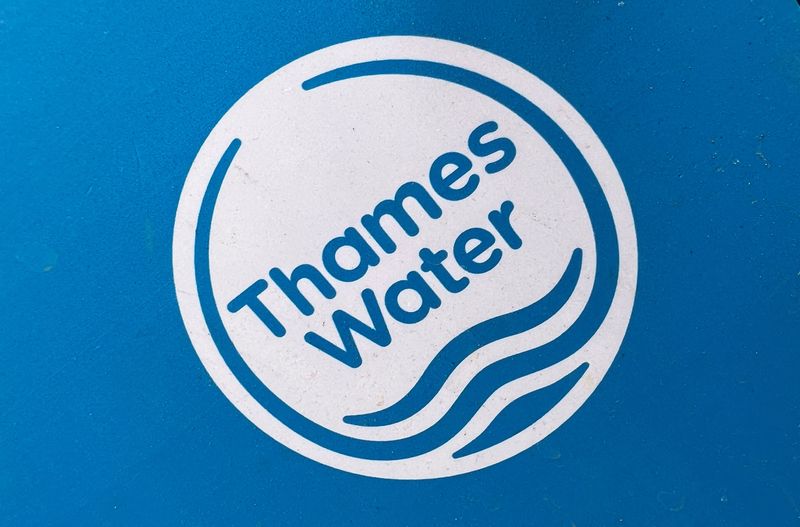By Sarah Young
LONDON (Reuters) - Thames Water has become the poster child for a British water industry under fire for its poor environmental record and financial mismanagement.
Buckling under the weight of its debt, Thames Water was under the threat of nationalisation before its shareholders stepped in on Monday to help plug a financial black hole.
A jump in the number of sewage releases across Britain over the last five years has shattered confidence in a privatised model which has permitted shareholders and executives to profit at the expense of clean rivers and beaches.
Here's a summary of major developments:
HISTORY
Britain's water and sewerage industry was privatised in 1989 by Margaret Thatcher's Conservative government, partly driven by the need to ramp up investment to meet EU environmental standards and upgrade its network of Victorian pipes.
After a period as a listed company, Thames Water was acquired by German utility RWE (LON:0HA0) in 2001. Five years later a group of investors led by Australia's Macquarie bought it.
During Macquarie's ownership from 2006 to 2017, Thames paid its investors dividends of 2.7 billion pounds ($3.45 billion) while its debt pile tripled to almost 11 billion pounds.
CURRENT OWNERS
Thames Water's biggest shareholder is Canadian pension fund Ontario Municipal Employees Retirement System, at 32%. Britain's Universities Superannuation Scheme (USS) owns 20% alongside other shareholders including an Abu Dhabi-based fund, another Canadian fund, Britain's BT (LON:BT) pension fund Hermes and China Investment Corp, who all have less than 10%.
It launched a turnaround plan in 2021, but with 14 billion pounds of debt and gearing already above 80% of the value of its assets, raising new debt to fund improvements was not an option.
Since last year it has been asking its shareholders for an extra 1 billion pounds of investment on top of the 500 million pounds they provided in March. Thames Water said on Monday they would provide 750 million pounds, and added it had strong liquidity of 4.4 billion pounds.
But the company also warned it would need an extra 2.5 billion pounds between 2025-2030.
Questions over shareholder willingness to stump up that level of cash when they have not taken out a dividend since Macquarie sold out six years ago mean there could be further financial challenges down the line.
Thames Water's financial report shows that dividends used to service debt obligations totalled 45 million pounds for 2022/23.
FINANCES
Nearly 60% of Thames Water's debt is index-linked, according to ratings agency Standard & Poor's, saddling it with higher repayments as inflation soars. At the same time, the cost of energy, labour and chemicals have all risen.
According to Refinitiv data, Thames Water has around 512 million pounds worth of bonds maturing in 2023, followed by close to 400 million in 2024 and 1.2 billion in 2025. The bulk of its bonds come due after 2034.
Thames Water's bonds, which plunged in late June over worries about state ownership, were up by as much as two pence in the pound on Monday as creditors welcomed news of the new equity investment.
OTHER UTILITIES
Regulator Ofwat is also monitoring the finances of Southern Water, majority-owned by Macquarie, and Yorkshire Water, whose biggest shareholder is the private equity arm of Singapore's GIC investment group.
Listed players Severn Trent (LON:SVT), United Utilities and Pennon (LON:PNN) tend to be better capitalised.
WHAT NEXT
The chairman and two interim co-CEOs of Thames Water, all of whom have been appointed in the last two weeks, will be questioned by a parliamentary select committee on Wednesday, before Ofwat bosses face questioning.
By Oct. 2, England and Wales's largest water companies must provide Ofwat with their business plans for the next regulatory period, 2025-2030.
They are likely to ask for a 25% rise in household bills, according to an estimate by The Times newspaper.
FUTURE CHALLENGES
Ageing infrastructure is an ongoing problem for Thames Water, with many of its pipes dating back to the 1800s and early 1900s and struggling to handle rising demand.
In 2022, water companies in England alone released raw sewage into rivers and the sea 301,091 times, according to Britain's Environment Agency. Thames Water was fined 3.3 million pounds last week, while Southern Water was fined 90 million pounds in 2021.
Water suppliers also need to invest to contend with population growth - up 5.9% in the last decade - plus the impact of climate change, which Ofwat warns include a higher risk of drought, and of sewers flooding from heavier downpours.
($1 = 0.7816 pounds)
